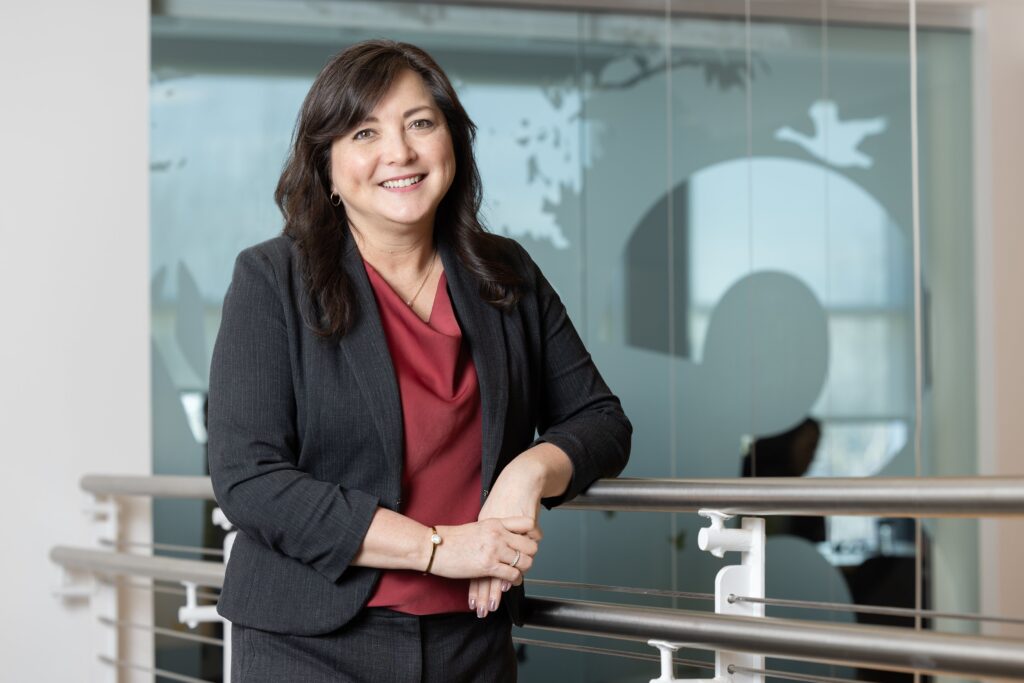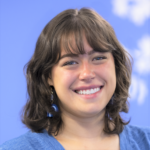Growing Clinical Research at Nationwide Children’s With Cynthia Gerhardt, PhD
Growing Clinical Research at Nationwide Children’s With Cynthia Gerhardt, PhD https://pediatricsnationwide.org/wp-content/uploads/2023/10/030923BS0057-1024x683.jpg 1024 683 Cynthia Gerhardt, PhD and Natalie Wilson Cynthia Gerhardt, PhD and Natalie Wilson https://secure.gravatar.com/avatar/d566866dc988c2fc5c66cb1ee157e9bc?s=96&d=mm&r=g- October 13, 2023
- Cynthia Gerhardt, PhD and Natalie Wilson

Dr. Gerhardt was appointed Chief Clinical Research Officer at Nationwide Children’s Hospital in April 2023. With integrating clinical care and research at the heart of the hospital’s strategic plan, she has big plans for ensuring our clinical research infrastructure continues to grow and evolve to support the best bench-to-bedside-and-back science for best outcomes.
Learn more about Dr. Gerhardt’s vision for clinical research at Nationwide Children’s and what lies ahead.
Q: What led you to pursue your new role?
A: I’ve been invested in supporting clinical research here for many years. About a decade ago, I became an investigator in and director of the Center for Biobehavioral Health. Since then, we’ve tripled in size and developed several training programs and core resources, such as the Behavioral Trials Office. Around the same time, Bill Smoyer, MD, invited me to become part of the Center for Clinical and Translational Science, which provides education, resources and pilot funds across The Ohio State University and Nationwide Children’s. I also truly enjoy mentorship and figuring out how to help others be successful. The opportunity to become chief clinical research officer seemed like a natural next step in my leadership journey.
Q: What are you most looking forward to about leading clinical research at Nationwide Children’s?
A: On an individual level, conducting research involves many challenges, and it can be hard to start a project, particularly when balancing clinical care and teaching. I’m a problem solver and hope that my skills in building teams, resources and training programs will be an advantage in this role. I’m also looking forward to making an impact on a larger scale and am excited about the emphasis on clinical research in the new strategic plan.
Nationwide Children’s is leading on several frontiers in science, including gene and cell-based therapies, health equity and population health, and behavioral health. As our scientists continue to generate many exciting discoveries, our research infrastructure must grow with them. We must anticipate needs by expanding data science capabilities, considering the ethical implications of new technologies, keeping abreast of regulatory and compliance issues, and training and retaining a skilled scientific workforce. I want to bring forward-thinking strategies that will address new challenges to innovation.
Additionally, many pediatric conditions are relatively rare, making it difficult to study the affected population at any single institution. Clinical trials for these populations require collaboration across multiple institutions and/or decentralized approaches to effectively disseminate our work to community providers. To truly impact public health, we must also expedite the timeline from bench to bedside to community by leveraging key partnerships and commercialization opportunities. With new strategic initiatives, we have a wonderful opportunity to fully integrate our clinical care and research to ensure our innovations quickly result in the best outcomes for our families.
Q: Why should a children’s hospital prioritize clinical and translational research?
A: An effective learning health system constantly evolves to optimize quality, safety and care. Clinical research informs better clinical care and vice versa.
Our families are often our best teachers, and many know that their child can receive the best possible treatment because another family agreed to participate in a research study. They want to help the families who will come next.
Additionally, in some areas, such as pediatric oncology, participating in a clinical trial is essentially the standard of care. Research consortiums such as the Children’s Oncology Group have allowed us to pool our resources, share knowledge and find cures faster. This approach to integrated clinical care and research is why we’ve had such incredible gains in survival rates for childhood cancer over the last 40 years. If we strive to lead the Journey to Best Outcomes for children and families, we also need to lead the discoveries and innovations that will advance care.
Q: What’s next?
A: We’re continuing to work with Business Planning and Development to refine and prioritize the strategic goals for clinical research. I am thrilled to partner with so many incredible individuals and teams across the hospital and research institute and at Ohio State to integrate clinical research resources across campuses and expand where needed.
Each clinical division now has a designated associate division chief for research who will serve as a liaison between me and their teams. Streamlined research onboarding, training and web-based resources are in development, along with renovation plans to provide new, integrated clinical research space. This space will include Clinical Research Services, the investigational pharmacy, testing rooms for social and behavioral research, and other lab space. As we build the Office of Clinical Research, we will continue to incorporate input from faculty and staff to ensure we meet the needs of the institution and our families.
This article appears in the Fall/Winter 2023 print issue. Download the full issue.
Dr. Gerhardt and Myeshia Harmon, MHA, CCRP, senior director of Clinical Research Operations at Nationwide Children’s, were recently guests on PediaCast, an educational podcast for parents and families. They discussed how pediatric clinical trials are designed, approved, funded and implemented, how safety is woven into the process, how results are shared with the public and translated into practice, and more.
About the author
Natalie is a passionate and enthusiastic writer working to highlight the groundbreaking research of the incredible faculty and staff across Nationwide Children's Hospital and the Abigail Wexner Research Institute. Her work at Nationwide Children's marries her past interests and experiences with her passion for helping children thrive and a long-held scientific curiosity that dates back to competing in the Jefferson Lab Science Bowl in middle school. Natalie holds a bachelor’s degree in sociology from Wake Forest University, as well as minors in women's, gender & sexuality studies and interdisciplinary writing. As an undergraduate student, Natalie studied writing and journalism, engaged with anthropological and sociological research with a focus on race and ethnic relations, served as executive editor for the student newspaper, the Old Gold & Black, and gained marketing experience as an intern for a nonprofit entrepreneurial incubator, Winston Starts, as well as by working for Wake Forest University School of Law Office of Communication and Public Relations and its Innocence and Justice Clinic.
-
Natalie Wilsonhttps://pediatricsnationwide.org/author/natalie-wilson/
- Posted In:
- Features
- Research
- Second Opinions







